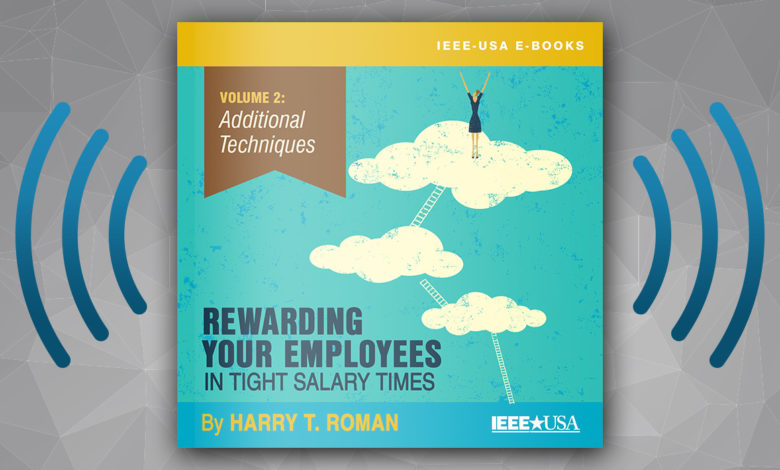
July’s free audio book for members continues examining the age-old dilemma every manager faces — how to reward employees on a tight budget. In this second volume, Rewarding Your Employees in Tight Salary Times—Volume 2: Some Additional Techniques, author Harry T. Roman discusses, describes and offers additional strategies, tips and techniques for rewarding key people.
Take a listen as Roman advises against fun, trendy forms of recognition–such as inviting employees to select something from an upscale gift catalog, or presenting a certificate for dinner for two at an expensive restaurant. The veteran engineering professional and educator says that while these popular reward mechanisms have their place, it’s important to recognize high-performing people in ways that will keep them motivated and on point–keeping these valuable staff members in your company, and in your department.
Instead, Roman encourages assigning special employees to special project activities, such as participating in community events; sponsoring local charities; helping to rehab abandoned buildings; raising funds for new hospital wings; blood drives; or working with local schools. “No great company today can afford to miss an opportunity to work in their community,” he says, “Assigning a special employee to these kinds of activities can be a welcome change of pace.”
The author believes that assigning star employees to work with local schools is a win-win–not only for the employees and the schools, but also for the company. “Employees will learn how to take complex subjects and boil them down into easy-to-understand, teachable moments,” he explains, “and they will also have delightful experiences they will want to repeat.” Equally important, he says schools are eager to work with businesses, as it brings relevancy to the courses they teach, as well as illustrating the process skills that distinguish innovative companies.
Roman notes that employees in different industries can show how problem solving makes a difference in people’s lives. He further points out that immersing schools in problem solving and design challenge activities is mutually beneficial to students and company employees. Roman also observes that companies that encourage their employees to participate in outreach to schools will reap the rewards of community recognition. The community will see such companies as caring organizations that want to serve for the greater good–as well as their customers.
Rewarding Your Employees in Tight Salary Times–Volume 2: Some Additional Techniques contains many more proven ideas for showing appreciation to key employees. Together with the first volume, these audio books provide managers with a wealth of ideas and inspiration.
Don’t miss this great opportunity: IEEE members can get their new, free July audio book by going to: https://ieeeusa.org/product/rewarding-your-employees-in-tight-salary-times-vol-2-some-additional-techniques/ . Follow the instructions there for downloading your free audio book in MP3 format—no Promo Code is necessary.
Volume 1 of this Audio Book is also still available free at: https://ieeeusa.org/product/rewarding-your-employees-in-tight-salary-times-vol-1-some-basic-techniques/
Why not download both for your audio book library—for free!
You can also purchase the companion e-books for your reference library at the same links. These award-winning e-books are only $4.99 to members and $7.99 to non-members.
Georgia C. Stelluto is IEEE-USA’s Publishing Manager; Manager/Editor of IEEE-USA E-BOOKS; InFocus Department Editor for IEEE-USA InSight; and Co-Editor of the IEEE-USA Conference Brief.






